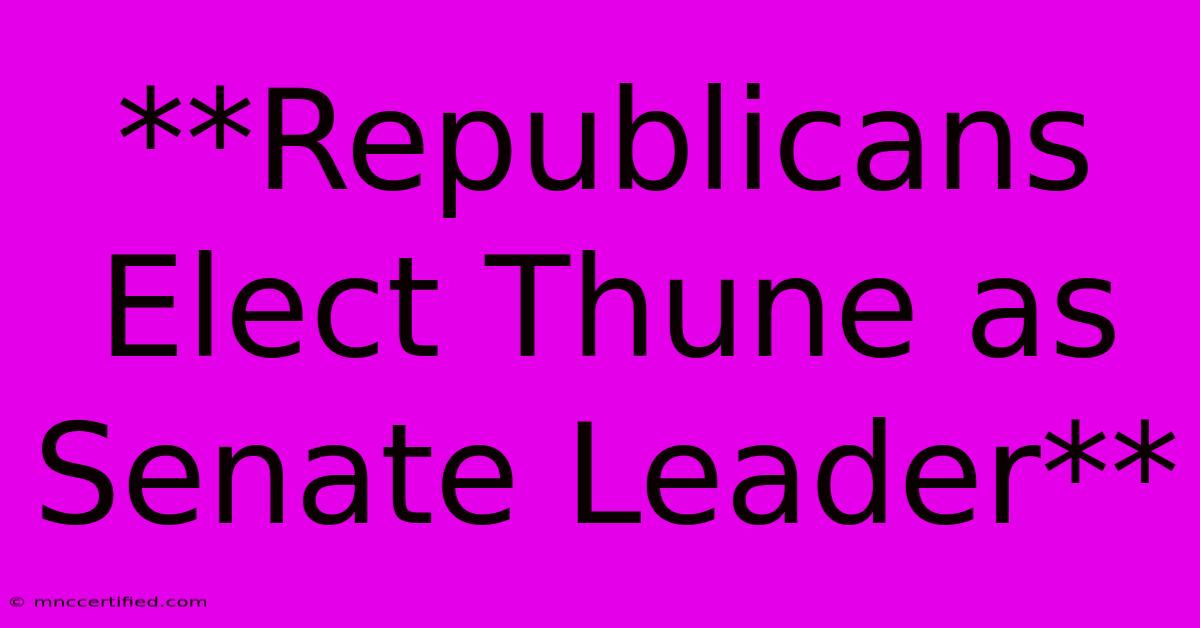**Republicans Elect Thune As Senate Leader**

Table of Contents
Republicans Elect Thune as Senate Leader: What This Means for the Future of the Party
On November 15, 2023, Senator John Thune of South Dakota was elected as the new Senate Republican leader, succeeding Mitch McConnell who stepped down after holding the position for 16 years. This marks a significant shift in leadership for the Republican party, raising questions about the party's direction and priorities moving forward.
Thune's Background and Views
Senator Thune, a long-time member of the Republican party, has a reputation as a pragmatic and strategic leader. Known for his ability to build consensus and navigate complex political landscapes, Thune has served in the Senate since 2005. His conservative stance on issues like taxes, spending, and regulation aligns with the Republican party's traditional values.
Thune's election as Senate leader signifies a potential shift towards a more moderate approach within the Republican party. While he remains committed to conservative principles, Thune is known for his willingness to compromise and find common ground, suggesting a departure from the hard-line tactics often associated with McConnell's leadership.
Implications for the Future of the Republican Party
Thune's election has generated both excitement and concern among Republicans. Some believe his leadership will usher in a new era of unity and effectiveness, enabling the party to achieve its legislative goals. Others express concern about the potential for compromise and moderation to dilute the party's conservative principles.
The 2024 elections will be a crucial test for Thune's leadership. Republicans face a challenging political landscape with a divided electorate and a potential presidential election where the party's direction and message could be at stake. Thune's ability to unite the party and articulate a clear vision for the future will be critical to its success in the upcoming elections.
Key Issues for Thune's Leadership
Thune will face numerous challenges as Senate leader. The party's relationship with former President Donald Trump remains a significant source of tension, with many Republicans divided on their support for the former president. Thune will need to navigate this dynamic carefully while maintaining the party's unity.
Furthermore, addressing the country's economic challenges, including inflation and rising debt, will be paramount. Thune's position on these issues will shape the party's approach to economic policy and influence its appeal to voters.
Conclusion
John Thune's election as Senate Republican leader marks a significant shift for the party. His leadership style, focused on compromise and strategic maneuvering, suggests a potential departure from the more aggressive approach of his predecessor. The 2024 elections will be a crucial test for Thune's leadership, revealing whether he can unite the Republican party and guide it towards success in the years to come.

Thank you for visiting our website wich cover about **Republicans Elect Thune As Senate Leader**. We hope the information provided has been useful to you. Feel free to contact us if you have any questions or need further assistance. See you next time and dont miss to bookmark.
Featured Posts
-
Arkansas Gymnastics Lands No 2 2025 Class
Nov 14, 2024
-
How To Know If I Have Gap Insurance
Nov 14, 2024
-
Trump Names Gaetz Attorney General Nominee
Nov 14, 2024
-
Kelly Insurance In Moultrie Georgia
Nov 14, 2024
-
Free Winter Lights Festival Canary Wharf January
Nov 14, 2024